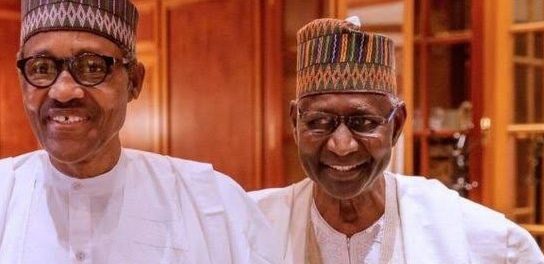Opinion
My Own Tribute To Abba Kyari – Cheta Nwanze

Yesterday a man was buried. Abba Kyari was, to many, the de facto president of Nigeria. Since his demise became public knowledge, there has been a deluge of praise for him, as well as criticism of course, which will always accompany the death of an influential figure. But something happened yesterday. There was a concerted effort to blackmail those criticising the late Mr Kyari, in some cases by implying that those criticising him would die soon.
Seriously? In a century’s time, not one person who is my agemate will be alive. Heck, in half a century, most of us will be dead, so those blackmail merchants miss the point.
Let’s look briefly at Abba Kyari’s role. The Chief of Staff, to my knowledge, functions to organise the life of his principal. There is a reason why the role is not mentioned in the Constitution, so for Abba Kyari to have become, by many accounts, the most powerful man in Nigeria was an aberration.
One of the things we tend to miss in this country, or to conflate, is holding opposing views. Saying that Abba Kyari was a good man, and that he was a bad leader/politician, are in no way contradictory, which brings me to something I noticed. I noticed is that pretty much everyone who spoke glowingly of the late Abba Kyari either knew him personally, or benefited from him, and therein lies one of the problems. No one appears to care for the country, just self.
In a country of 150 million people, not everyone could have met him to ascertain his goodness as a man. But, if he had been a good leader/politician, everyone could have benefitted from him.
So what is Mr Kyari’s legacy?
He completely emasculated the Vice President and reduced him to a placeholder within the government. He stepped on toes and enabled a repressive state which is an anathema to the consensus required for democratic governance. He irreversibly shaped the policies of this government, and what have they delivered?
Big government policies everywhere (one of which we’ll talk about soon), and consistent growth averaging less than population growth, which means that under his watch all Nigerians, including you reading this, got poorer. Heck, his border closure policy led to higher inflation, and under his watch, the trade sector, our second biggest employer of labour, has been in recession for two years. Based on statements made by the CBN governor each time he met with the man, the CBN’s interventionist stance, and refusal to pursue policies that would have let the economy breath, it’s clear who was calling the shots of a regime that created arbitrage opportunities which were ruthlessly exploited by people in and around the centres of power.
As Chief of Staff, Kyari was not shy of dabbling in actual governance. For example, he was instrumental in shaping the contours of the Buhari administration policy thinking on agriculture, defining the government’s focus on achieving rice self-sufficiency. Going by official data, some progress has been made.
Nigeria now produces more rice annually, about four million tonnes a year, than Egypt, Africa’s largest grower of the crop. However, this was not due to any burst of innovation or the encouragement of mechanised agriculture. First, Egypt cut its rice production by 40% in order to save water. The reality is that Nigeria’s rice crop yield has remained static for decades – at 2 tonnes per hectare, it is about half of Asia’s average.
Nigerian farmers simply devoted more land to grow rice, taking advantage of subsidised inputs such as fertilizer; itself a process which operated as something close to a racket which benefited politically connected manufacturers and importers. Despite increased production, there is still a mismatch between domestic consumption and production, hence the continued smuggling of rice in spite of a 9-month border closure championed by Kyari.
As if to confirm what was already evident, Nigeria nabbed a 49.17 score in the 2019 World Bank’s Enabling the Business of Agriculture Index – a measure which monitors such things as the supply of seeds, registering fertilizer, water security, registering machinery, livestock sustenance, protecting plant health, food trading and accessing finance – and way behind South Africa (68.73) and Kenya (64.80).
Perhaps the one event that proved the near omnipotence of Mr Kyari was the controversy that trailed the recruitment of his daughter, by the Nigeria Sovereign Investment Authority, the federal agency that manages Nigeria’s hardly excess crude oil revenues. While the NSIA denied the allegations and insisted that her recruitment “went through a transparent process” and was not the result of political interference, it was hard to justify the organisation’s insistence that her role was a “junior one” when she was hired as its Assistant Vice President (the NSIA insists it is merely the 9th level out of its 22-level grading system).
A year on from the crisis, Aisha remains in her position and Mr Kyari, until now a towering figure in Nigerian politics, reigned supreme.
As an individual, his final destination is left only for God Almighty to decide. As to his personal bonhomie, that’s for those who knew him as an individual. But in the final analysis, that tinge of “some animals are more equal than others” was Abba Kyari’s legacy, and it showed in the shameful sight of his close associates completely disregarding social distancing guidelines at his funeral yesterday.
Cheta Nwanze is lead partner at SBM Intelligence
Disclaimer
It is the policy of NewsWireNGR not to endorse or oppose any opinion expressed by a User or Content provided by a User, Contributor, or other independent party. Opinion pieces and contributions are the opinions of the writers only and do not represent the opinions of NewsWireNGR






